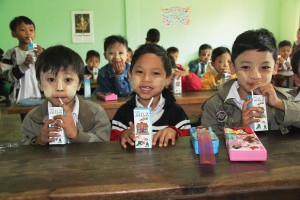100 million Tetra Rex Bio-based packs expected to sell in 2016

Tetra Pak, one of the world’s leading food processing and packaging solutions providers, recently held an event at its facility in Lund, Sweden, to discuss its developments in the sustainable packaging sector. It has now been a year since the company introduced the world’s first fully renewable carton package – Tetra Rex Bio-based – after its introduction to the market with Finnish dairy company, Valio. At the same time, the company also decided to use Tetra Pak’s 100 per cent bio based closures for all its gable-top packages.
Available in a range of sizes, from 250ml to 2,000ml, Tetra Rex Bio-based is manufactured solely from a combination of plastics derived from sugar cane and paperboard. Like the Forest Stewardship Council (FSC) certified paperboard, the plastics can be traced back to their origin, affording the package the highest category of bio-based certification from Vincotte, the internationally-recognised assessment body.
The bio-based plastics used by Tetra Pak are produced by Brazilian chemical company, Braskem, which sources all of its feedstock from sugar cane grown on degraded pastures.
Now, the company has reported that it expects to deliver more than 100 million packs of Tetra Rex Bio-based to customers during 2016. This comes after the technology has gained popularity across Finland, Sweden and Norway, with brands such as Valio, Arla Foods, Vermlands Mejeri, and TINE.
Bjørn Malm, head of corporate responsibility at TINE, Tetra Pak’s latest customer to use the package, said: “We believe growing our business sustainably is not just good for the environment, it also improves our competitiveness and provides product differentiation. Thanks to Tetra Rex Bio-based we have been able to take a significant step towards our own environmental goals and have committed to making all our milk cartons renewable from next year.”
The package’s impressive environmental profile was widely recognised in the form of seven awards last year, including first place in the Sustainable Innovation category at the Ethical Corporation Responsible Business Awards, held in London in September.
“The success of Tetra Rex Bio-based in its first year is extremely encouraging,” said Charles Brand, executive vice president product management and commercial operations at Tetra Pak. “We are proud to be the first company to deliver a package made entirely from plant-based materials. Every package is traceable to its origin, helping customers to enhance their brand and communicate with consumers. This is a significant milestone in Tetra Pak’s long term ambition to provide 100 per cent renewable packaging across our product portfolio.”
Driving sustainability forward
Tetra Pak has also launched its 2015 Sustainability Update highlighting its achievements in environmental performance and social responsibility across the year. The headlines of the report include the launch of the Tetra Pak E3, a filling machine that uses electron beams to sterilise packaging material.
The company also highlighted good progress with its global operational health and safety (OHS) management system. The target is to achieve OHSAS 18001 certification for all of its manufacturing sites by the end of 2016. So far 50 per cent have been certified, which is up from 42 per cent in 2013.
Other news included Tetra Pak’s continued support of Dairy Hub projects in Bangladesh, Kenya, Nicaragua and Sri Lanka with a new project opened in Senegal early in 2015. Through these projects, the company helps to secure long-term supply of locally produced milk in developing countries. During the first quarter of last year, the company’s Deeper in the Pyramid (DiP) unit also launched more than 20 new products designed specifically for the low income consumer segment in over 10 countries, while increasing the number of packages sold by 12 per cent from 2014.

